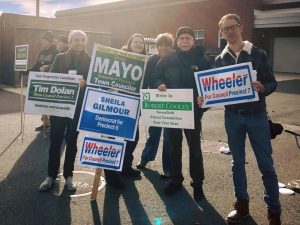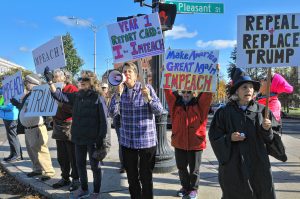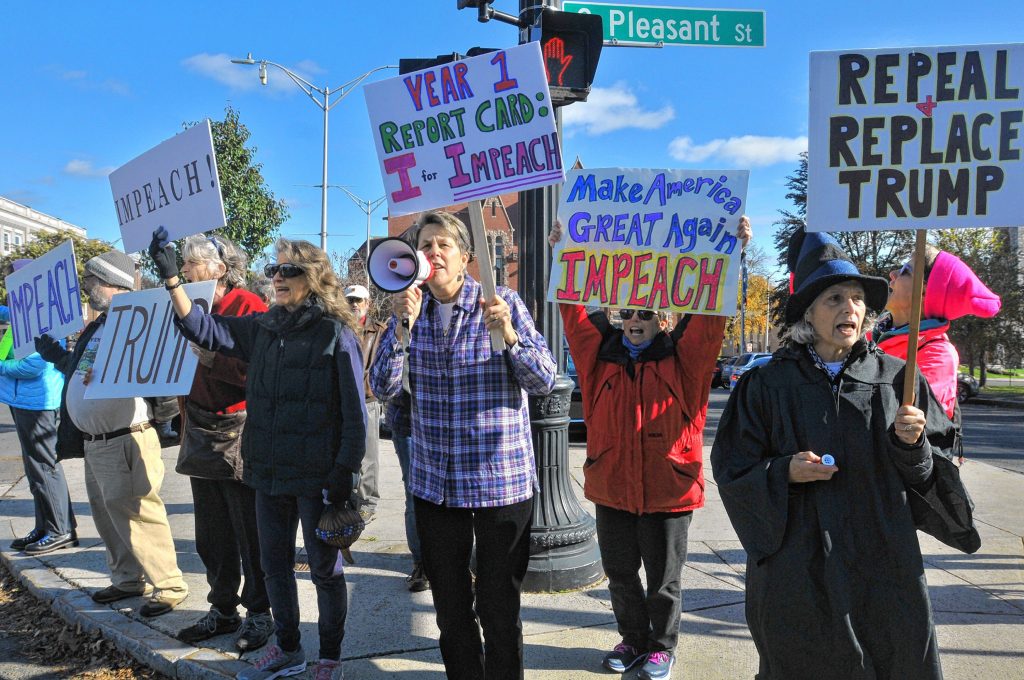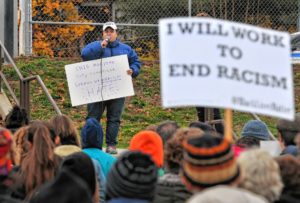 Progressives had reasons to celebrate the morning of Nov. 8 more than at any point in the past year. Not only did the Democrats capture the big prizes of Election Day on Nov. 7 — the governors races in New Jersey and Virginia — but Democratic and progressive candidates prevailed across the nation, including in the Pioneer Valley.
Progressives had reasons to celebrate the morning of Nov. 8 more than at any point in the past year. Not only did the Democrats capture the big prizes of Election Day on Nov. 7 — the governors races in New Jersey and Virginia — but Democratic and progressive candidates prevailed across the nation, including in the Pioneer Valley.
Now, a year after the 2016 election, when Donald Trump was elected president and Republicans retained both houses of Congress, the tide is shifting, and the ripple effects are being felt even down to the most local political bodies.
That likely means a further move left in local policies, even in liberal western Massachusetts.
HOLYOKE
Even before the results were announced on election night, the excitement in the room at Gateway City Arts in Holyoke was palpable. The crowd Tuesday night was made up of a mix of Mayor Alex Morse’s supporters, campaign team, and family, and no one seemed to be too worried about the results. Around 8:30 p.m., there was an explosion of shouts from one corner of the room where City Councilor Jossie Valentin, who ran unopposed for her position in Ward 4 in this election, held up her phone to show the results. Morse was elected for the fourth time, and in January he will begin Holyoke’s first four-year mayoral term.
The mayoral run was not the only race in the city. Seats in Wards 1, 2, 3, and 6 on the City Council were all contested, and the number of at-large seats was reduced from eight to six. Incumbents Diosdado Lopez and Howard Greaney Jr. both lost their at-large seats and City Council President Kevin Jourdain, who did not run for re-election for his Ward 6 seat, will be replaced by Juan Anderson-Burgos.
Valentin said that Tuesday’s election results will lead to a shift in City Council dynamics, especially around progressive legislation that has been met with a lot of resistance in the past.
“We have been swimming against the stream,” Valentin said.
Valentin pointed to the Anti-Hate Resolution that she proposed last December, a measure that stated the city was opposed to hate speech that surfaced following the 2016 election, as an example of obstructionism on the council. The resolution would not have been legally binding, but it never left committee even after heated public debates.
The council voted 8 to 7 to move the resolution to committee rather than vote on it, and Lopez, Geaney, and Jourdain were all among those who voted to send it to committee.
The face of politics in Holyoke is changing. According to Valentin, around 50 percent of Holyoke residents are Latino, and now, come January, about one-third of the City Council will be Puerto Rican. On election night, Valentin posed for a photo with fellow city councilors Nelson Roman, Gladys Lebron-Martinez, and Councilor-elect Anderson-Burgos. All four representatives are Puerto Rican and three of them identify as gay. Valentin said minority representation on the council has been a problem since she took office representing Ward 4 in 2013.
Easthampton also elected its first Latino city councilor, Puerto Rican Homar Gomez, on Nov. 7, along with a new mayor, Democratic activist Nicole LaChapelle.
Lebron-Martinez said that a more diverse board will make serving the whole city of Holyoke easier.
“It’s very inclusive of everyone,” Lebron-Martinez said. “We’re all about the whole city. With this progressive group coming on, I’m hoping to get a lot done in neighborhoods that have been neglected for years,” Lebron-Martinez said.
Lebron-Martinez, who represents Ward 1, is hoping to continue her work on domestic issues, like sidewalks and clean streets, on the housing development on Lyman Terrace, and on supporting High Street businesses.
Some other incumbent city councilors do not feel like Tuesday’s results represent much of a change.
Linda Vacon, who Represents Ward 5, believes the council will remain fundamentally the same following the election, but she does feel like there was a difference in this year’s campaign.
“The mayor ran a coordinated campaign with a few other candidates,” Vacon said. “My perception is that a few people have the mayor to thank for their positions.”
Vacon also mentioned her concern with campaign donations in this election cycle. Executives from the medical marijuana company GTI Massachusetts NP Corp., that is currently building a facility in Holyoke, donated a total of $11,800 to six City Council candidates (Lisi, Lebron-Martinez, Valentine, Anderson-Burgos, Roman, and Sullivan) and an additional $3,200 to Morse’s campaign.
The donations are legal, but Vacon said that she is concerned with the donations because the City Council is still actively reviewing the zoning around the facility.
“I believe that this is wildly inappropriate,” Vacon said.
Vacon said that one of the key things she is hoping to see approved by the City Council this year is a much more robust and comprehensive ethics ordinance to address the problems that she saw in this year’s campaign.
“I’m just looking for consistency in application of what is good government,” Vacon said.
David Bartley, the Ward 3 city councilor, also said that he does not think that there has been a substantial change to the City Council. Bartley hopes to work to preserve open spaces in his ward and to improve parks and infrastructure in the next two years.
“It’s not about rhetoric or labels, but about substance,” Bartley said. “There’s a lot of rhetoric that comes from certain corners of government. Let’s see if they can turn those into specific legislative accomplishments.”
Bartley, who was elected to City Council the same year that Morse was first sworn in as mayor in 2012, said that, for him, the creative economies coordinator position that Morse championed and then did not continue to fund in 2016, and Morse’s reversal on bringing a casino to Holyoke in 2012, are examples of the Morse’s lack of vision.
“If he comes in with a vision that’s good for the city, I’ll be in his corner,” Bartley said.
As he heads into his seventh year in office, Morse said that having a four-year term will allow him to continue to build on the progress he has made so far.
“In a four-year term you can really just focus on public policy without having to constantly worry about a re-election campaign around the corner,” Morse said.
Morse also addressed the campaign finance concerns.
“We have state finance laws for a reason,” Morse said.
He also pointed out his campaign’s grassroots statistics: this year alone his campaign had 500 individual donations and 75 percent of them were under $100.
On Morse’s list of policies to address in the coming term are organizational reforms and residential and economic development. Morse would like to add a mayor-appointed chief financial officer to the city’s finance department, “to have somebody that is looking long term at our budget.”
He also plans to continue working on a plan to increase home ownership in South Holyoke, which, according to Morse, is made up of 95 percent rentals.
“People shouldn’t have to move out of their neighborhood when they move up the economic ladder,” Morse said. “How do we provide people with stable, affordable housing in the neighborhood they grew up in, where their family and social connections are?”
Two buildings outside of downtown, the former Geriatric Authority near Ingleside and the old Lynch School, are also being looked at for redevelopment.
While many people in Holyoke did not vote, about 31 percent of residents did. Theo Fadel, a Holyoke resident, said that she and her partner support Mayor Morse and the new progressive faces on City Council.
One of Fadel’s nieces, Bennet von Erp, age 10, said that “Sometimes (Morse) makes mistakes, but sometimes he makes good choices.”
“We like a progressive landscape,” Fadel said. “We like a landscape that is real, that’s more about the community.”
Morse said that he is also happy to see all of the progressive councilors in the chamber, including newly-elected Anderson-Burgos.
“I’m really optimistic about the fact that we should be able to get some things done that we just haven’t been able to do,” Morse said. “Just knowing that when we present proposals that are good for the city, they’re not blocked just because they’re presented by my administration.”
Ward 6 resident Tiffany Mikalunas voted for Anderson-Burgos.
“He has really good ideas about what he can do for Ward 6,” Mikalunas said.
Anderson-Burgos is a more progressive candidate than his predecessor and is hoping to work on youth engagement and attracting more businesses to the city.
“Am I a progressive candidate? Yes. But in order to work together we must work with a collaborative mind,” he said. “My grandmother used to say that you can’t hear the other voice behind a closed door.”
GREENFIELD
A progressive rallying cry in Greenfield was the town’s safe city ordinance. The ordinance, which would have offered support and protection to residents regardless of immigration status, was defeated over the summer. But the council that will be seated starting Jan. 1 could bring back that ordinance thanks to the wave of progressive town councilors who will begin their new terms.
 Incumbent Penny Ricketts, who previously supported the safe city ordinance, and current Precinct 8 Town Councilor Ashli Stempel, who was absent for the safe city vote in August, were both elected to at-large seats, while four candidates in precincts 5 through 8: Timothy Dolan, Sheila Gilmour, Otis Wheeler, and Douglas Mayo, said they would support a safe city ordinance in the future.
Incumbent Penny Ricketts, who previously supported the safe city ordinance, and current Precinct 8 Town Councilor Ashli Stempel, who was absent for the safe city vote in August, were both elected to at-large seats, while four candidates in precincts 5 through 8: Timothy Dolan, Sheila Gilmour, Otis Wheeler, and Douglas Mayo, said they would support a safe city ordinance in the future.
The only councilor to be elected who did not support the ordinance was incumbent Precinct 9 Councilor Daniel Leonovich, who faced no opposition for his seat.
Dolan said he thinks the recent wave of progressive Democrats attaining public office is a reaction to conservative control at the national level.
“We’re finally starting to see an organized left, which I think is really important,” he said.
David Greenberg, a member of the coordinating committee for Franklin County Continuing the Political Revolution, said he thinks the wave of progressive victories across the country was sparked with discontent and anger at conservative leadership.
He said Franklin County Continuing the Political Revolution endorsed five out of the six council candidates in Greenfield and expects there to be “real organizing in town” come Jan. 1.
Some of the issues he thinks the more progressive leaning council should tackle include revisiting the safe city ordinance, addressing the opioid crisis in Greenfield, bettering the quality of education in the community, and workers’ rights, specifically in regards to supporting the nurse’s strike at Baystate Medical Center.
Gilmour said with the power dynamic reversed on the council, come January it’ll be easier to support progressive policies such as the safe city ordinance, and improving needle exchange in Greenfield.
Wheeler said within the first six months he expects the ordinance to be brought back for a vote.
“In light of the raid by ICE agents against undocumented farm workers in Hatfield that took place on Election Day, I think it’s obvious that protection of otherwise law abiding citizens needs to be a priority and safe city is part of that. It’s a first step, but it’s an important one.”
Ricketts, who described herself as a moderate, said she thinks there would be enough votes to pass the safe city ordinance in the future.
“I really take my cue from what the voters say,” she said. “From each issue, I do lots of research and listen respectfully to both sides, and then I vote accordingly. I can’t come from a place of conservative or progressive … I’m really there for the people.”
She said if the ordinance does come back she wouldn’t want it to “monopolize the whole year.”
“I think our biggest issue is going to be building a new library and building a public safety complex,” she said. “It may not hit this year, but we have to start planning for it to see what the taxpayers want. Can they afford all that? Where are we going to get the money for each project?”
On the chilly autumn morning of Nov. 9, several people walking through downtown Greenfield shared their thoughts about the recent election.
Walter Koblinski, 90, of Greenfield, said he thinks the council shouldn’t support a safe city ordinance for undocumented immigrants.
“They’re gonna come in and have the jobs,” he said. “The people who live here all the time are gonna be out of a job. That’s what’s going to happen.”
Margaret Payne, a resident of Shelburne Falls, said she supports safe city initiatives.
“It’s a kind of civil disobedience that calls attention to the reality that some of the deportation that’s going on is horrible … My church has worked with young people from Guatemala and when you send those people back they get killed. They really should be getting asylum.”
Dolan said he would like to move forward with creating a comprehensive plan to help people in Greenfield affected by the opioid crisis.
“The current council has spent a lot of time debating what I consider to be a very regressive ordinance that would limit needle exchange in Greenfield, which eventually failed with no votes in favor. I would like to introduce something that’s more in tune with the needs of the residents and informed by the science of addiction studies.”
He said the council would need to improve prevention, harm prevention, treatment, and recovery programs for people suffering from addiction in Greenfield.
Ricketts, who serves on a voluntary opioid task force, said she’s unsure how much the new council would be engaged with developing solutions to the opioid epidemic in Greenfield.
“It really depends on how much time people are willing to put in, but if it’s anything that helps with the task force and needle exchange, I hope it’s brought forward. This is an all hands on board issue.”
#RESIST
In downtown Amherst, at an “Impeach Trump” rally on Nov. 8, the 40 or so participants were jubilant at the results of the previous day’s elections. They speculating on what it all meant locally, nationwide, and for their own cause: removing President Trump and Vice President Mike Pence from office.

Georganne Greene, of Pelham, leads a group of protesters against President Donald Trump across Main and Pleasant streets in Amherst. Carol Lollis photo
Linda Spink clanged a pair of cowbells as grousps of four and five people walked over holding signs reading “Impeach” and “Trump You’re Fired.”
“I’m from Virginia and I was so proud of Virginia,” Spink said, referring to not only the 9-point victory for the Democratic governor candidate Ralph Northam, but also more than a dozen seats flipped from Republican to Democrat in the Virginia House of Delegates, bringing the split from two-thirds Republican to about half.
“It bodes well for the election in 2018,” she continued.
Amherst resident Rob Okun, an organizer of the rally, said he felt emboldened about the anti-Trump movement following the election results, and car horns honked their support as he spoke to a reporter.
“The momentum feels important, kind of celebratory to be here in light of the complete renunciation of Republican politics in yesterday’s elections,” he said.
For Okun, the results are less about Democrats having all the answers and more about the resistance movement against Donald Trump.
“This is the worst that it’s ever been,” he said. “And I was a college student when Richard Nixon was in office.”
Micah Lott, known as Big Wind, of Riverton, Wyoming, came to the area staying in Chicopee to help activists called the Sugar Shack Alliance fight a pipeline going through western Massachusetts. He attended the rally as a member of the Northern Arapaho Tribe, and wore a mask painted white, black, yellow, and red, which he said represented the colors of humanity.
“This doesn’t stop when we impeach Donald Trump; this doesn’t stop when we impeach (Vice President) Mike Pence,” he said. “We have to look more internally about how we are going to fix these problems in the long run. Because Trump isn’t the problem. He might be an example of the problem, but he’s not the problem. A lot of people think like him and that’s why he’s in office.”
Nancy Sardeson of Amherst said she expected to see more progressive policies come about everywhere.
“I think this is a movement, and I just hope we don’t let down,” she said.
Meg Bantle can be reached at mbantle@valleyadvocate.com. Chris Goudreau can be reached at cgoudreau@valleyadvocate.com. Dave Eisenstadter can be reached at deisen@valleyadvocate.com.







